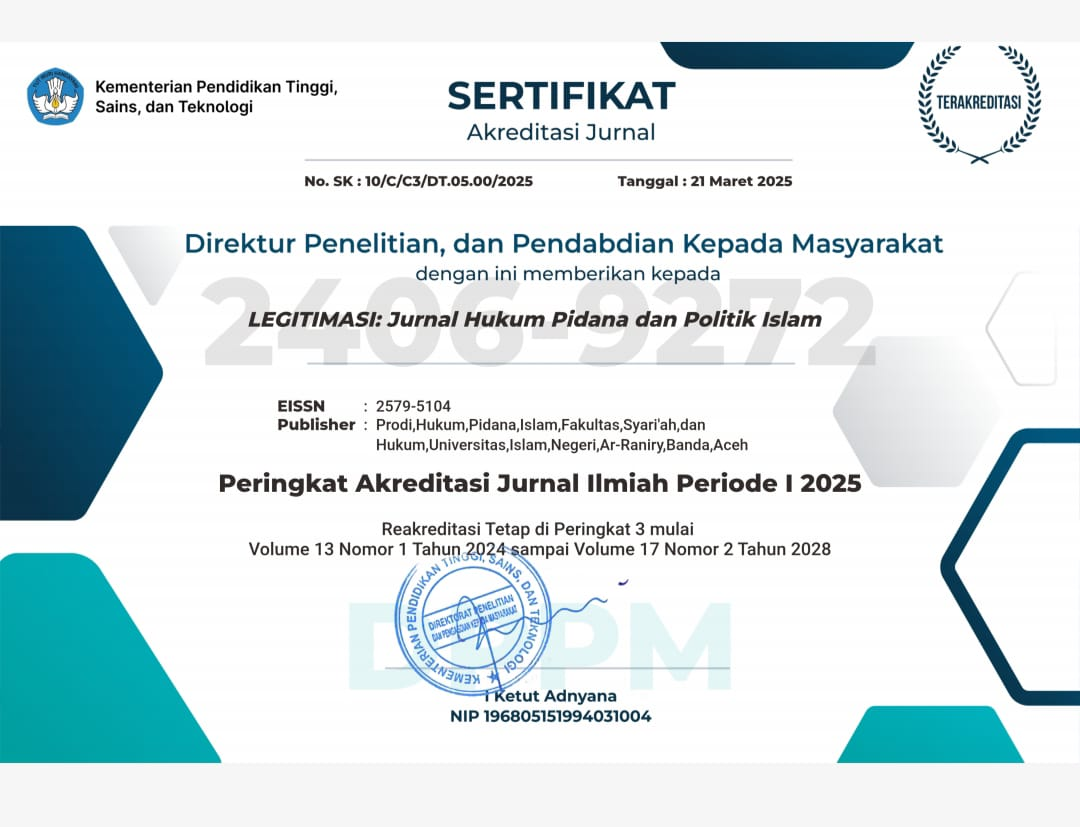The Tradition of Ndarohi: Diversity of Punishments, Settlement of Fights in the Kute Pasekh Pekhmate Community from the Perspective of Islamic Criminal Law
DOI:
https://doi.org/10.22373/legitimasi.v14i1.30057Keywords:
Ndarohi Custom, Punishment, Fighting, Islamic Criminal LawAbstract
This study analyzes the Ndarohi custom as a customary sanction imposed on the perpetrators of a fight. The Ndarohi custom is a tradition that has been passed down from generation to generation in the Kute Pasekh Pekhmate community, Lawe Alas District, Southeast Aceh Regency. The Kute Pasekh community believes that the Ndarohi custom is able to reunite the perpetrators of a fight as a family by imposing customary sanctions in the Ndarodi tradition. The focus of this study is how the traditional Kute Pasekh community maintains the Ndarohi custom in resolving fights amidst the strong current of modernization of criminal case resolution through litigation. The purpose of the study was to determine the practice of the Ndarohi custom in resolving fight cases, and to preserve the Ndarohi custom in the modern era. This study uses a qualitative descriptive method, data obtained through field interviews and literature. The results of the study show that sanctions for resolving disputes in fight cases are resolved according to the Ndrohi custom through a deliberation process. Then the party found guilty is charged with medical expenses for the victim and is given a sanction in the form of money and one goat, according to the decision from the results of the deliberation by Sakhak Bekhempat. Sanctions in the Ndarohi custom have various types according to the quality of the crime committed by the perpetrator. Fights that cause physical harm, not bleeding, are subject to the Nucupi custom sanction or the mbabe nakan sekhimah sope sekhanting sanction; all medical costs are borne by the perpetrator of the customary crime. While criminal acts of fighting that result in bleeding wounds are subject to the sanction of drawing error and a fine in accordance with the written customary provisions. The Kute Pasekh community still strongly adheres to the Ndarohi custom in resolving customary criminal disputes. In addition to being a hereditary tradition, it is also effective in uniting the relationship of the customary community to obtain eternal peace.
References
Alam, Qadeer. "The Qisas and Diyat Law in Pakistan: Prosecution of Offence of Murder." Islamic Studies 58, no. 4 (2019).
Arief, Barda Nawawi. Problems of law enforcement and criminal law policy in crime control. Jakarta: Kencana Prenada Media Group, 2018.
Beckmann, Franz von Benda Beckmann, and Keebet von Benda. "Who's Afraid of Legal Pluralism." Journal of Legal Pluralism and Unofficial Law 47 (2002): 37.
Djuned, T. "The Influence of Islamic Law on the Formation of Acehnese Customary Law." In Dynamics of History and Globalization, edited by Darni M.Daud. Banda Aceh: Syiah Kuala University Press, 2005.
Hasjmy, A. Acehnese Customs in History. New York: Beuna, 1982.
Hidayat, Herman, Herry Yogaswara, Tuti Herawati, Patricia Blazey, Stephen Wyatt, and Richard Howitt. "Forests, Law and Customary Rights in Indonesia: Implications of a Decision of the Indonesian Constitutional Court in 2012." Asia Pacific Viewpoint 59, no. 3 (2018).
Hoekama, Andre J. "European Legal Encounters Between Minority and Majority Culture: Cases of Interlegality." The Journal of Legal Pluralism and Unofficial Law 37 (n.d.).
Scott, Sale. "Pluralistic Legal System, Pluralistic Human Rights?: Teenage Pregnancy, Child Marriage and Legal Institutions in Bali." Journal of Legal Pluralism and Unofficial Law, 2019.
Hurgronje, Christiaan Snouck. Aceh: The Customs. Jakarta Indonesia: Indonesian Netherlands for Islamic Studies, 1996.
Husni, Jalil. "Implementation of Special Autonomy in Aceh Province Based on Law Number 11 of 2006." Canon: Journal of Legal Science, 2010.
Ismail, Badruzzaman. Encyclopedia of Acehnese Culture. Banda Aceh: Aceh Customary Council, 2018.
———. Principles of Customary Law. Banda Aceh City: Aceh Traditional Council, 2009.
Jamrozi, Ahmad Syafi'i Sulaiman, and Ratno Lukito. "The Logic of State Authority on the Control of Agrarian Resource (Socio-Anthropological and Islamic Perspective)." American Journal of Social Sciences and Humanities 4, no. 4 (2019): 516–27.
Kartini, Sri. Customary Crimes in the Land of Alas. Kuta Cane: Alas, 2014.
Kusumaatmadja, Mochtar. Concepts - Legal Concepts in Development. Alumni, 2002.
Lev, Daniel S. "The Supreme Court and Adat Inheritance Law in Indonesia." The American Journal of Comparative Law 11, no. 2 (1962).
Lukito, Ratno. "Islamic Law and Adat Encounter: The Experience of Indonesia." ProQuest Dissertations and Theses, 1997.
———. "Law and Politics in Post Independence Indonesia: A Case Study of Religious and Adat Courts." Estudiia Islamika 6, no. 2 (2014).
———. "The Enigma of National Law in Indonesia: The Supreme Court's Decisions on Gender-Neutral Inheritance." Journal of Legal Pluralism and Unofficial Law 38, no. 52 (2006).
Malik, Faissal, Syawal Abduladjid, Dewa Gede Sudika Mangku, Ni Putu Rai Yuliartini, I. Gusti Made Arya Suta Wirawan, and Putu Ronny Angga Mahendra. "Legal Protection for People with Disabilities in the Perspective of Human Rights in Indonesia." International Journal of Criminology and Sociology 10 (2021).
Rose, Sitti. "The Development of the Aceh Customary Court Legal System." Legitimacy: Journal of Criminal Law and Legal Politics 10, no. 1 (2021).
Muhammad, Rusjdi Ali. "Reconciliation for the Settlement of Criminal Cases: Reactualization of Local Wisdom in Indonesian Criminal Law." Legitimacy: Journal of Criminal Law and Legal Politics 10, no. 2 (November 19, 2021): 171.
Muhammad, Rusjdi Ali, and Dedy Sumardi. Local Traditional Wisdom: The Absorption of Islamic Sharia in Acehnese Customary Law. Banda Aceh: Aceh Islamic Sharia Office, 2011.
Nagin, Daniel S., Robert M. Solow, and Cynthia Lum. "Deterrence, Criminal Opportunities, and Police." Criminology 53, no. 1 (2015).
Najib, Agus Moh. "Reestablishing Indonesian Madhhab 'Urf and the Contribution of Intellectualism1." Al-Jami'ah 58, no. 1 (2020).
Nawawi. Penalties and Penalties for Criminal Offenses. Kiuta Cane: Aceh Customary Council of Southeast Aceh District, 2014.
Plockaya, Olga A. "Customary Law Experience of Crime Prevention in the Customary Law of the Permian Peoples." Russian Journal of Criminology 13, no. 2 (2019).
Putra Jaya, Nyoman United. "Customary Criminal Law (Sanctions) in the Reform of National Criminal Law." Legal Issues 45, no. 2 (2016): 123.
Salim, Arskal. "Adat and Islamic Law in Contemporary Aceh, Indonesia: Unequal Coexistence and Asymmetric Contestation." Samarah 5, no. 2 (2021).
Soekanto, Soerjono. The Problem of the Position and Role of Customary Law. Jakarta: Academica, 1979.
Sumardi, Dedy. "Islam, Legal Pluralism and Reflection of a Homogeneous Society." Ash-Syirah Journal of Sharia and Law 50, no. 2 (2016).
Sumardi, Dedy, Ratno Lukito, and Moch Nur Ichwan. "Legal Pluralism within the Space of Sharia: Interlegality of Criminal Law Traditions in Aceh, Indonesia." Samarah 5, no. 1 (2021): 426–49.
Sumardi, Dedy, Mukhsin Nyak Umar, Ruslan Sangaji, Firdaus M Yunus, and Rahmatul Akbar. "Transition of Civil Law to Public Law: Integration of Modern Punishment Theory in Criminal Apostasy." Ahkam: Journal of Sharia Science 22, no. 1 (June 30, 2022).
Widyawati, Anis. "Criminal Policy of Adultery in Indonesia." Journal of Indonesian Legal Studies 5, no. 1 (2020).
Zada, Khamami. "The Politics of the Enforcement of Islamic Sharia in Aceh and Kelantan (1993-2014)." AL-IHKAM: Journal of Law & Social Institutions 10, no. 1 (2015).
Interview
Qorik, Religious figure in Kute Pasekh Pekhmate, interview on May 22, 2021.
Satuman, a traditional figure in Kute Pasekh Pekhmate, Lawe Alas District, Southeast Aceh Regency, on May 20, 2021.
Zulkarnaen, Head of Kute Pasekh Pekhmate Village, Lawe Alas District, Southeast Aceh Regency, January 2, 2021
Jamidun, village secretary of the Kute Pasekh Pekhmate Village Apparatus, January 2 2021
Rasmidin, a resident of Pasekh Pekhmate village, Lawe Alas District, Southeast Aceh Regency on May 18, 2021.
Abdul Halim, a resident of Pasekh Pekhmate village, Lawe Alas District, Southeast Aceh Regency on February 20, 2021.
Syahrudin, community of Pasekh Pekhmate village, Lawe Alas District, Southeast Aceh Regency on April 19, 2021.
Downloads
Published
Issue
Section
License
Copyright (c) 2025 Tarmizi M. Jakfar, Edi Yuhermansyah, Edi Yuhermansyah, Nurbaiti Nurbaiti, Nurbaiti Nurbaiti

This work is licensed under a Creative Commons Attribution-NonCommercial-ShareAlike 4.0 International License.
Authors who publish in Legitimasi: Jurnal Hukum Pidana dan Politik Hukum agree to the following terms:
- Authors retain copyright and grant the journal right of first publication with the work simultaneously licensed Attribution-ShareAlike 4.0 International (CC BY-SA 4.0) that allows others to share the work with an acknowledgment of the work's authorship and initial publication in this journal.
- Authors are able to enter into separate, additional contractual arrangements for the non-exclusive distribution of the journal's published version of the work (e.g., post it to an institutional repository or publish it in a book), with an acknowledgment of its initial publication in this journal.
- Authors are permitted and encouraged to post their work online (e.g., in institutional repositories or on their website) prior to and during the submission process, as it can lead to productive exchanges, as well as earlier and greater citation of published work. (See The Effect of Open Acces)












